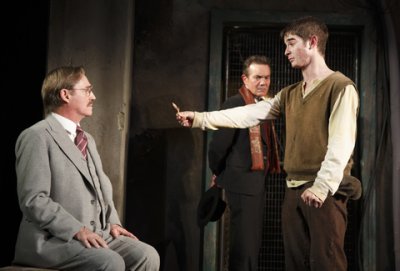Incident at Vichy
An admirable staging of a flawed, but effective Arthur Miller play.

Richard Thomas, Derek Smith and Jonathan Gordon in a scene from “Incident at Vichy” (Photo credit: Joan Marcus)
[avatar user=”Joel Benjamin” size=”96″ align=”left” ] Joel Benjamin, Critic[/avatar] Arthur Miller is having a great posthumous 100th birthday! A View from a Bridge opened on Broadway to sensational reviews to be followed soon by The Crucible. Now a revival of Incident at Vichy, his frightening, microcosmic examination of Nazi-occupied France during the height of World War II, is enjoying a fine revival at the Signature Theatre. While the first two plays are each experiencing radical re-assessments, the director of Vichy, Michael Wilson has opted for a straight-forward, naturalistic interpretation in which each character exists as a finely etched portrait and the set (by Jeff Cowie) is a real, frightening place down to the period French newspapers plastering the holes in the windows.
Herded into a bleak detention room, ten men, representing a too-perfect cross section—religion, class, political persuasion—of 1942 Vichy, France, plucked for unknown reasons off the street slowly come to the realization that the undercover detectives who pinched them (Curtis Billing and Alec Shaw) had more in mind than a bureaucratic check of identification papers. More and more stories of Jews, Gypsies and communists being shoved into furnaces in concentration camps deep in Poland has filtered down to them and fear and panic take their toll.

Darren Pettie, Jonny Orsini and Evan Zes in a scene from “Incident at Vichy” (Photo credit: Joan Marcus)
Lebeau (Jonny Orsini), a young, headstrong (Jewish) painter; Bayard (Alex Morf), a tense, working class man of clearly left-wing leanings; Marchand (John Procaccino), a blustery businessman with a briefcase; Monceau (Derek Smith), an actor (and Jew) with a talent for rationalization; a Gypsy (Evan Zes) repairing a probably stolen copper pot; a woefully bedraggled 15-year- old Boy (Jonathan Gordon), a Jew, who only wanted to pawn his mother’s ring for food money; an old religious Jew (Jonathan Hadary); Leduc, a Jew and psychiatrist (Darren Pettie) who left his secure hiding place to get medicine for his wife; Von Berg, an Austrian nobleman (Richard Thomas), seemingly abducted in error; and a scornful, probably Jewish Waiter (David Abeles) from a neighboring café which has catered to the needs of their interrogators some of whom he considers cultured gentlemen: all interact, discuss, fight, surmise and share biographies as one-by-one they are taken out to be brought before the Vichy and Nazi authorities to meet their fates.
These authorities are led by a “racial ‘scientist,’” Professor Hoffmann (Brian Cross)—young, blond and scary—under whom a conflicted Major (James Carpinello) and a far less conflicted Police Captain (AJ Cedeño) manage, with one dramatic exception, to ship off the Jews and return the gentiles to their everyday lives.
That above-mentioned exception is the satisfying, but unlikely, denouement of the play, involving a sudden burst of generosity of spirit hitherto hidden under bluster and a façade of self-delusion.

Darren Pettie, Jonathan Hadary, Derek Smith, James Carpinello and Jonny Orsini in a scene from “Incident at Vichy” (Photo credit: Joan Marcus)
The acting, though a tad uneven, is still on a high level. This cast, completed by Demosthenes Chrysan as the Waiter’s boss, generate a convincing ambiance of heightened reality, skillfully avoiding becoming walking/talking metaphors. Mr. Wilson has directed them as real, living, breathing people forced into an artificial theatrical situation.
David C. Woolard’s period perfect costumes help define the characters while David Lander’s lighting make the most of the single set. John Gromada’s sound design heightens the sense of isolation with its vague street noises, bits of music and chillingly over-amplified off-stage laughter.
Incident at Vichy, though preachy and schematic, still has a great deal to say about evil and the human spirit. This production serves Arthur Miller admirably.
Incident at Vichy (through December 20, 2015)
Signature Theatre
Pershing Square Signature Center, 480 West 42nd Street, in Manhattan
For tickets, call 212-244-7529 or visit http://www.signaturetheatre.org
Running time: 90 minutes with no intermission






Leave a comment